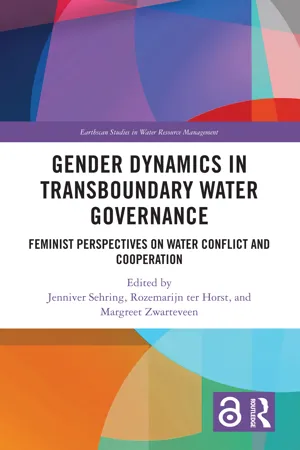
Gender Dynamics in Transboundary Water Governance
Feminist Perspectives on Water Conflict and Cooperation
- 210 pages
- English
- ePUB (mobile friendly)
- Available on iOS & Android
Gender Dynamics in Transboundary Water Governance
Feminist Perspectives on Water Conflict and Cooperation
About This Book
This volume assesses the nexus of gender and transboundary water governance, containing empirical case studies, discourse analyses, practitioners' accounts, and theoretical reflections.
Transboundary water governance exists at the intersection of two highly masculinised fields: diplomacy and water resources management. In both fields, positions are mainly held by men, and core ideas, norms, and guiding principles that are presented as neutral, are both shaped by men and based on male experiences. This book sheds light on the often hidden gender dynamics of water conflict and cooperation at the transboundary level and on the implicit assumptions that guide research and policies. The individual chapters of the book, based on case studies from around the world, reveal the gendered nature of water diplomacy, take stock of the number of women involved in organisations that govern shared waters, and analyse programmes that have been set up to promote women in water diplomacy and the obstacles that they face. They explore and contest leading narratives and knowledge that have been shaped mainly by privileged men, and assess how the participation of women concretely impacts the practices, routines, and processes of water negotiations.
This volume will be of great interest to students and scholars of water governance, water diplomacy, gender, international relations and environmental politics. It will also be of interest to professionals and policymakers involved in supporting gender mainstreaming in water cooperation.
The Open Access version of this book, available at www.taylorfrancis.com, has been made available under a Creative Commons Attribution-Non Commercial-No Derivatives 4.0 license.
Frequently asked questions
Table of contents
- Cover
- Half-Title
- Endorsements
- Series
- Title
- Copyright
- Contents
- List of figures
- List of tables
- List of contributors
- 1 (En-)gendering Water Diplomacy
- PART I Rethinking Frameworks and Knowledge
- PART II Gender Mainstreaming Policies in Transboundary Water Governance: Obstacles and Impact
- PART III A Gender Perspective on Transboundary Water Institutions and Processes
- Index